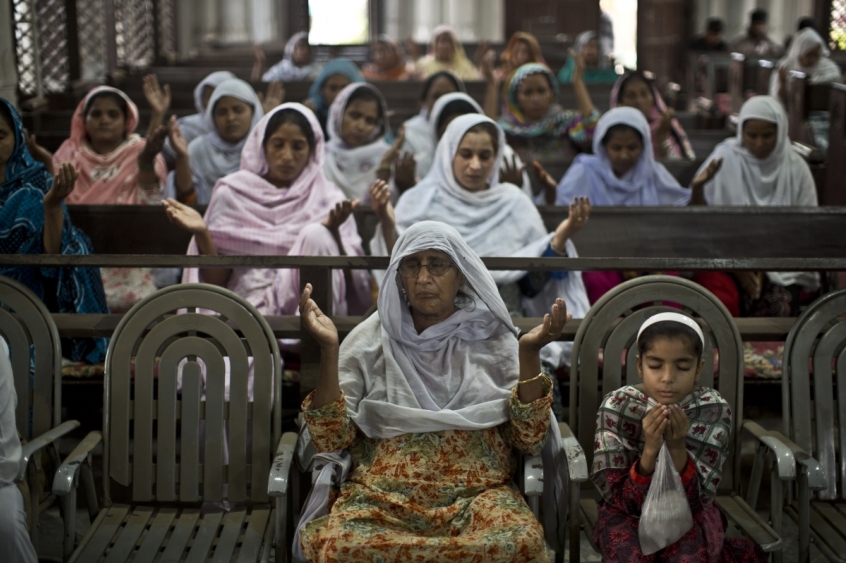
I work supporting persecuted Pakistani Christians and hear often the horror stories of abduction, rape, false blasphemy accusations, and murders that they suffer. However, much like the rest of the world, I have been shocked by the scale of the attack on All Saints church in Peshawar.
Estimates put the death toll from the twin suicide bombing at around 75 with over a hundred more injured, far exceeding the death toll of the Gojra attack, which was horrifying enough with eight Christians burnt to death, and also exacting far more damage than the rampage in Lahore in May this year in which a hundred Christian homes were torched.
My fear is that this attack in Peshawar could be a game changer in the persecution against Pakistani Christians. What they have been used to up until now is radical elements within their communities taking pot shots at them, usually with a false accusation of blasphemy as the pretext to destroy their property or worse, kill them.
But Peshawar differs in respect to the level of premeditation behind it and its execution by a Taliban-linked militant group. This appears to have been a carefully planned attack similar in nature to what Nigerian churches are experiencing at the hands of another militant Islamist group, Boko Haram.
I do not consider it overstepping the mark to say that a war is being waged against Christians and Christianity in Pakistan, and what concerns me immensely is reports from eyewitnesses and survivors of the Peshawar attack who say that the security forces were slow to respond and that they felt abandoned in their moment of crisis.
Grieving relatives also complained that there were not enough medical facilities or enough staff to look after the injured. One person complained to the media that his uncle died because there was no oxygen available to him. I think one reason for the high death toll is the delay in medical treatment reaching the injured but I don't understand the reason for this as Lady Reading hospital has long experience of the volatile situation of the area and deals with similar emergencies regularly.
It is this sense of frustration that no doubt simmered in angry protesters who reportedly charged at Pakistan's former interior minister Rehman Malik as he visited the wounded at the hospital. PakistanToday.com reports that Malik had to hide in the office of the hospital's chief executive when he was confronted by victims' families angry at the treatment of their loved ones.
I cannot help but question whether the wholly inadequate response to the attack was because of hatred towards Christians, an attitude which sadly prevails in Pakistani society even outside of the organised radical groups. Hatred against Christians has intensified in recent years and even the more moderate Muslims in Pakistan look upon Christian citizens as completely inferior.
Just to give you some idea, it is not uncommon for police to turn away Christian families when they come to the police station to report that their daughter has been abducted by a Muslim man, forced to convert to Islam, and then made against her will to marry this man. And when Muslims have gone on the rampage in Christian colonies causing huge amounts of destruction and even loss of life, there have been instances where charge sheets were drawn up against the Christians and not the Muslim perpetrators.
What seems so unthinkable in Western countries I am sad to say is not so unthinkable in Pakistan, where life is nothing short of dangerous for religious minorities. The UK's former defence minister Liam Fox said Pakistan was the most dangerous country on earth and I would have to agree with him there, certainly for Christians at least.
The Peshawar attack has shattered any pretence of it being otherwise, something that should trouble parties like Imran Khan's Pakistan Therek Pakistan and the Pakistan Muslim League (N), which both ran their election campaigns with the promise to make Quaid's Pakistan – a place where, as our founding father said, Pakistanis would be equal without any distinction of colour, race or religion. How far we are from that vision.
Hafiz Tahir Ashrafi is among the Muslim leaders who have condemned the Peshawar attack. Ashrafi, who is considered very supportive of Christians, has criticised any justification of violence against Christians as some sort of jihad, as Christians have not lifted their arms against Muslims. He has also demanded that the Pakistani government tell the public on what grounds they are engaging in dialogue with the Taliban and how they are going to deal with attacks like these that have not been halted despite the talks.
How sincere is the Taliban about peace in Pakistan if their network in the country is continuing to be involved in horrific attacks like Peshawar? And the Pakistani government's conduct leaves a lot to be desired too. Either it does not understand the gravity of the situation or is intentionally ignoring the reality as there is no justification whatsoever for holding talks with the Taliban when no ceasefire on terrorist attacks has been put in place. The government should have made this a first condition for any dialogue.
Malik may have been chased into a hospital office for refuge but I can at least appreciate his criticism against the Pakistani government that it has been too soft in its approach to militants and that they should be dealing with militants an iron hand.
No one has ever been punished for provoking hatred against Christians, which acts as a great encouragement to radicals. Instead of Quaid's Pakistan, Christians have had to watch over the decades as their rights were steadily eroded while the Islamisation of the country took hold and Sharia law started to be enforced against them with increasing zeal. The laws and the policies that were adopted in the past by the military in the name of national security or by dictators to justify and prolong their rule have resulted in religious intolerance, extremism, sectarianism and hate against non-Muslims, a toxic combination that is only fuelling an unbroken cycle of violence against Christians.
Pakistani Prime Minister Nawaz Sharif may have to answer some embarrassing questions at the United Nations General Assembly about the situation of Christians in light of the Peshawar attack, but for our political leaders, no amount of embarrassment seems to be enough to provoke them into genuine action to eradicate extremism from the country. They may be red-faced for a moment in international meetings and mumble out some kind of tautological commitment to improving the human rights situation, but once they are comfortably back on Pakistani soil it will be business as usual.
With so little prospect for change inside Pakistan, my hope is lying increasingly with the international community, which should challenge the country's leaders and use trade and diplomacy wherever possible to make them do what is right.
Nasir Saeed is Coordinator of CLAAS UK, an organisation providing free legal and practical support to persecuted Christians in Pakistan













